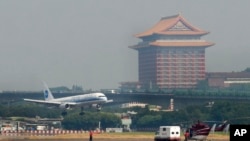Taiwanese people seldom saw tour groups from their old political rival China before 2008. Since the two sides reached an agreement on tourism that year, millions of mainlanders have visited the nearby island to take in its sights. But tourists and Taiwanese now complain of how they are treated. Now, Taiwan’s government has a new scheme to ease rising tensions.
Chinese tourists have been able to visit Taiwan in groups for seven years, but find bus rides too long with too many mandatory shopping stops. Some wait 40 days to get permits for the trip. Taiwanese complain that the same groups are too loud, litter the ground and bargain too hard on small purchases. Taiwan’s government hopes to ease those complaints with a month-old scheme that would guarantee quick permits and smooth travel for those willing to spend the most money.
Anthony Liao, president of Phoenix Tours in Taipei, said this program to lure high-end travel groups will increase overall travel from China by 10 percent. The former standing supervisor in a local travel association adds that Chinese tourists want more quality time at Taiwan’s attractions.
He said there has been a saying among mainland Chinese coming to Taiwan, which is that they eat worse than pigs and run faster than horses. Liao said that is their way of making light of things.
For decades, mainland Chinese seldom visited Taiwan because the Beijing government sees the island as part of its territory and Taiwanese officials had worried that an influx of people would undermine their self-rule. After Taiwan President Ma Ying-jeou took office in 2008, the two sides shelved political differences to begin signing economic agreements, which included a deal to open group tourism.
The island now receives as many as 5,000 group tourists per day, bringing the total arrivals from China to 2.8 million last year alone. Their visits gave the Taiwanese hospitality sector revenues of $14 billion last year, more than twice the figure of 2008.
Industry people say the surge in arrivals has increased competition among travel agencies, in turn lowering prices and quality of service. That growth in low-end tourism has angered both sides, prompting a search for new ways to sustain the benefits to Taiwan's hotels, restaurants and travel agents.
Chen Kai-huang, public relations manager at Taipei's five-star Grand Hotel, expects all of Taiwan to benefit from the revenues of high-end tourism.
Chen said that if these high-end groups can raise their travel expenses, it would be a big help for all of Taiwan. She added that increased competition among every type of business is inevitable, so it all depends on how a hotel promotes its specialties.
The program launched in May gives tourists instant entry permits to Taiwan in exchange for staying most nights in five-star hotels and spending at least $60 on lunch and dinner combined. Their tour buses cannot travel more than 250 kilometers per day, and mandatory shopping trips are banned. The first high-end group, 12 people who came from the Shanghai area for five days in May, spent about $1,400 per person.




